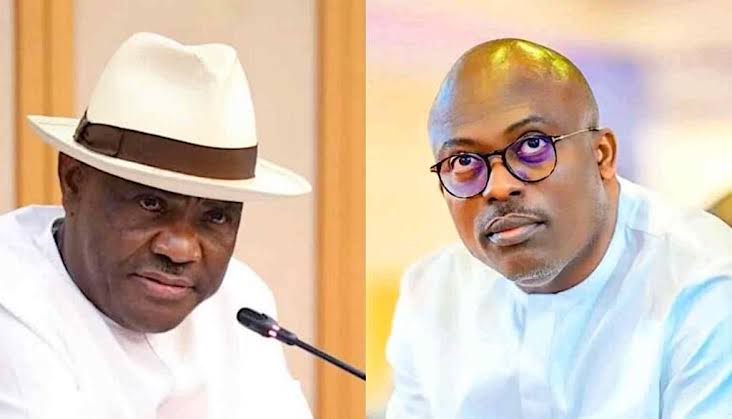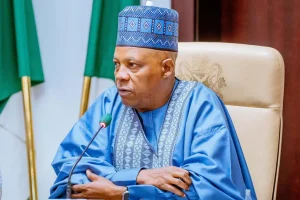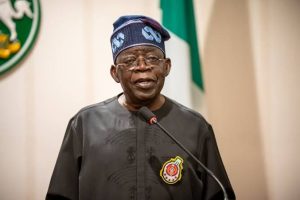
A fresh political rivalry has emerged in Jigawa State, as the current Minister of Defence, Badaru Abubakar, finds himself at odds with his successor, Governor Umar Namadi.
Appointed by President Bola Tinubu in August 2023, Abubakar transitioned from state governor to federal minister, leaving the leadership of Jigawa in the hands of Governor Namadi. However, despite Abubakar’s move to a national role, his influence in Jigawa politics remains significant, creating tension as the two leaders navigate their new roles and competing interests.
This power struggle is reminiscent of a recent high-profile clash between Nyesom Wike, the Minister of the Federal Capital Territory (FCT), and Rivers State Governor Siminalayi Fubara, once Wike’s close political ally. These conflicts highlight a broader trend in Nigerian politics, where former governors appointed to federal positions continue to wield influence in their home states, often resulting in friction with their successors who seek to assert independence and redefine local governance.
The conflict between Abubakar and Namadi reportedly began over Governor Namadi’s selection for the state House of Assembly’s speakership. According to sources, Namadi’s choice for the speaker role allegedly violated an agreement he had with Abubakar, who had helped groom him politically and supported his rise to governor. Abubakar’s allies argue that, by disregarding this understanding, Governor Namadi has failed to respect the guidance and mentorship of his political “godfather,” a dynamic deeply embedded in Nigerian political culture.
Tensions grew further as Governor Namadi filled key administrative positions with technocrats, sidelining many of Abubakar’s loyal supporters. The new governor appointed these technical assistants in an apparent bid to strengthen his administration and establish his own governance approach, independent of the former governor’s influence. For Abubakar’s supporters, however, this move is seen as a strategic attempt by Namadi to dilute their influence, a move that Abubakar’s allies believe undermines the political legacy Abubakar established in Jigawa.
The rivalry became especially visible when Abubakar’s supporters organized a high-profile relief effort in response to a tragic petrol tanker explosion in Jigawa. Without consulting the state government, the former governor’s camp distributed much-needed aid to victims of the incident. Many observers viewed this as a calculated move by Abubakar’s faction to demonstrate their ongoing influence and highlight what they see as the shortcomings of the current administration’s response. By providing direct support to affected communities, Abubakar’s allies signaled that his influence extends beyond his federal role and remains rooted in the needs of the state’s citizens, potentially challenging Namadi’s leadership.
Supporters of Minister Abubakar argue that Namadi has shown insufficient respect and gratitude toward his predecessor, who they claim paved the way for him in Jigawa politics. They insist that Abubakar deserves a level of deference from the new governor, not only for his mentorship but for his role in shaping the state’s political landscape. Conversely, those in Governor Namadi’s camp contend that while the governor has shown appropriate respect and loyalty, his recent decisions are a necessary part of asserting his independence and establishing his administration’s direction. According to them, Namadi’s focus on appointing qualified technocrats reflects a forward-looking strategy for Jigawa, moving beyond personal loyalties to prioritize professional expertise and governance.
The growing divide has raised concerns among political stakeholders and party members, particularly within the ruling All Progressives Congress (APC). Some fear that this feud could escalate into a full-blown political crisis, potentially undermining the party’s unity and effectiveness in the state. If left unresolved, the tension between the two camps could weaken APC’s influence, posing a risk to its prospects in the 2027 general elections. For a state like Jigawa, where political stability is critical to development efforts and investment, a prolonged power struggle could have significant repercussions for both governance and economic growth.
The broader implications of this feud extend beyond Jigawa State. As more former governors like Abubakar transition to influential federal positions, similar power struggles may emerge in other states. These tensions underscore a key challenge in Nigerian politics: the balance between respecting past political allegiances and empowering new leaders to shape their own paths. The conflict between Abubakar and Namadi offers a case study in the complexities of succession politics, where loyalty, influence, and independence collide.
As the 2027 election approaches, the dynamics within Jigawa’s APC will be closely monitored by political analysts, stakeholders, and citizens alike. The outcome of this feud could redefine power structures in the state and may serve as a bellwether for similar conflicts nationwide. For now, the unfolding rivalry between Minister Abubakar and Governor Namadi remains a focal point in Jigawa politics, setting the stage for what could become one of the most pivotal contests in the state’s recent history.





